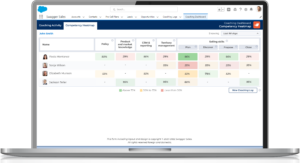How to Coach your Sales Managers
5 ways to Accelerate their Transition from “Super-Reps” to Leaders
One of the biggest and most common impediments to productivity growth in B2B sales teams is the lack of coaching skills in front-line sales managers. The step-up from an individual contributor to someone leading a team is one of the most difficult transitions in most salespeople’s careers, and many (promoted because they were great salespeople) never make the transition.
For those managing a field sales teams (where conversational analytics software like gong.io or SalesLoft aren’t an option), or a team selling into the enterprise where the sales process is complex and requires bespoke planning of each key customer interaction, the skill set is a dramatic step-up.
Managers need to answer fundamental questions including:
- How do I use and maximize the value of field travel?
- How should I establish coaching cadences for each member of their sales team?
- How do I trade off between hitting this quarter’s numbers vs building the skills of the team to hit it in future quarters?
Let’s dive into 5 simple ways to support faster and more effective transition to success for your managers.

1. Start with mindset, metrics and remuneration
Most smart people will work towards their Key Performance Indicators (KPIs). This is especially true of sales professionals – most companies spent significant time and effort crafting sales performance metrics for sales reps based on revenue, pipeline, win rates and (sometimes) margins.
Too often we see Sales Manager metrics pointing almost exclusively at revenue. This is obviously a critical measure, but if that’s all there is then you are encouraging your managers (who tend to already be great salespeople) to sell rather than lead. And for many managers, that is their comfort zone – (grabbing the fishing line and fishing for the reps rather than helping them learn to fish).
The problem is that this fails to scale capability. A “super-rep” manager can’t be in every important meeting, and any advice to their team will tend to focus only on the largest opportunities.
As a result, the most important part of a good sales manager’s role is the development of her team – building “sales muscle” – their ability to sell without her help. With 6, 8 or 10 direct reports, this is the single biggest force multiplier for the team.
Track revenue performance (obviously), but add manager performance metrics based on competency assessment and coaching of the team. As a general guide, around 20% of bonuses for a front-line manager should be based on this part of her role.
2. Deploy training – but not just an event
A good sales coaching training program for new managers is essential. Unfortunately, we see two common gaps:
- Most sales manager training is structured as a single 1-2 day event, rather than a process (learning retention from a single training event is rarely more than 10% within 30 days), and
- Sales leadership is a much harder and less intuitive set of skills to learn than that of an individual contributor, yet more money is invested in the sales reps than their managers.
Develop (or outsource) a high quality Sales coaching training program that is focused on skills and tools, not just knowledge. Just like good sales training, the best training leans heavily on role plays – preferably video recorded for playback and analysis – to provide the “A-Ha” moments that drive true behavior change. These exercises also provide a simple methodology for practicing coaching conversations – we favor the simplicity of the GRAD / GROW model.
Extend the training beyond an event – schedule monthly check-ins and support over the following 3-6 months, and provide mentorship from your more experienced and successful managers.
3. Focus on pre-call planning and field travel
Coaching skills come into their own during field travel. Difficult customer sales meetings are absolutely the best way to surface performance improvement opportunities for sales reps. The one-on-one and in-person coaching conversations that happen after a sales meeting are pure coaching gold.
Yet most field travel is wasted (or at least, delivers far less value than it should). Inexperienced sales managers use it primarily to help advance deals for their salespeople, not to assess competency gaps and opportunities, and coach the gaps.
Coach the people, not just the deals.
Most front line managers have 6-10 direct reports, and on average will spend less than 3% of their time with each salesperson on their team. That 3% has a massive impact on the other 97% where the sales rep is working solo.
Train your managers to get (and give) much more value from field travel with these simple adjustments:
- Insist on a pre-call plan for every meeting that the sales manager will attend. Field travel is expensive, and precious. A pre-call plan allows pre-call coaching (to assess planning gaps), and in a debrief, an objective review which can start with the simple question – “Did we achieve our meeting goals?”
- Unless the meeting is a critical one and the rep is still learning, managers should use these joint calls to observe the rep, rather than lead the meeting. Good manager training will show the managers how to be an effective “2IC” (Second in command) and coach, rather than lead the call.
- The primary outcome of a day in the field with “mid-performing” reps should be that the sales manager and the sales rep have a better understanding of any competency gaps. That understanding drives much higher productivity and scalable sales performance than any one deal that the manager can help nudge along herself on the day.

4. Create a simple competency matrix
Top sales teams know “what good looks like”.
This requires consideration of what competencies and behaviors you are expecting from the team, and should form the basis for your sales managers’ assessment and coaching of their team members.
It amazes me how much time and effort many sales leaders put into designing the perfect sales funnel, gates and stages, but with almost no thought put towards the people and competencies that will actually drive that pipeline velocity.
It need not be complicated. Effective sales management competency framework for reps would typically include
- Territory and Account Management – is the rep pursuing the right parts of the right accounts in their territory,
- Product, market and competitor knowledge – less about product knowledge, more towards the value propositions that matter for key decision makers in the sale, and
- Selling skills – the ability to plan for, and execute, the big non-routine meetings that really move the needle in a complex sale.
Depending on the nature of the sales reps and their deal types, you may want one or two other competencies such as policy knowledge (for heavily regulated deals such as those in finance or healthcare), and prospecting. But do not go beyond five core competencies – if it cannot be understood by a new hire within 5 minutes, it’s probably too complicated.
Once you have a competency framework, your sales leaders can then focus on assessing, and building, those competencies in their team using a common framework.
5. Support the sales team with integrated CRM tools
Effective sales leaders strive to make their front line sales managers’ lives easier, not harder.
Effective coaching creates a coaching process workflow – competency assessment, planning, the coaching conversations themselves, action plans and follow-ups to close the loop. It allows a manager to lead different team members based on individual need and capabilities:
- New hires need training and advice to ramp up quickly,
- Mid-pack performers need coaching, (the hardest group to lead), and
- Top performers need little coaching, with a leadership style more focused on motivation.
Workflows lend themselves well to software , and the best coaching solutions are integrated with the tools your sales managers use every day – your CRM. This also gives your sales leaders drill-down visibility to the coaching and planning process, driving greater discipline and accountability. It becomes easier to answer simple but critical performance management questions like:
- “Which of my front line sales manages really knows how to coach?”
- What’s our sales readiness level? Where are the competency gaps in my field sales team?
-
For Salesforce users, here’s a simple drop-in coaching solution that we like
-
- Pre-call planning with manager feedback,
- In-workflow competency assessment and field travel support,
- Coaching plans, recorded coaching sessions with follow-up reminders and action plans,
- Integrated coaching tips and training content,
- Leadership drill-down visibility to drive coaching discipline, and
- Full native Salesforce CRM integration.

For more info regarding SWIFT, click the button to get a more detailed account of SWIFT can offer you and your team!
6. Bonus tip – Gain sales leadership buy-in early
This one is listed last, but it really should come first.
Successful sales teams have a coaching culture, and culture comes from the top.
Positive leadership messaging is critical to gaining the buy-in from a large sales organization. We see too many sales leaders talk the talk on building capability, but spend almost all of their time and effort on sales cycles, pipeline and forecasting, regularly dropping everything else to hit this quarter’s results.
We’ re not saying quarterly numbers aren’t important – revenue is, after all, the key output from the sales organization. But if coaching gets dropped every quarter, and KPIs don’t reward those who build true “sales muscle”, your field managers will deprioritize coaching because they see you doing the same thing.
The best sales teams set not just sales goals, but coaching goals. And the best leaders measure them, care about them and reward them.
Summary
It may seem obvious, but your team’s performance is a direct result of their competencies. Equipping your front-line managers to build “sales muscle” through their coaching and leadership skills (as opposed to just helping push deals) can be the highest ROI investment you can make in your sales team.
Good coaching!
25 Minutes Can Transform Your Business
SWIFT™ turns your CRM from a database into a high performance sales engine with integrated call planning, coaching and competency assessment.
We’ll demonstrate how this Salesforce plug-in can drive discipline, accountability and performance across your sales team.

